
Jul 16, 2016 | Focolare Worldwide
Risk-dependent  «I’m a priest. One of my former course mates in the seminary who didn’t continue the course for priesthood fell into the habit of gambling, and developed an addiction. He was a brilliant man. His wife had left him due to the debts he accumulated and also his own family didn’t want to have anything to do with him. His earnings were not enough to cover the bank interests. When he contacted me to ask my help, I listened to him lengthily. But his main worry was only to pay his debts, and did not want any counsel. I introduced him to a doctor friend and a lawyer: the addiction issue was evident. So I tried to find a centre that could treat this problem and also the lawyer committed his free services. Now he’s in an institute and recovering well. One day while I was praying for him, I realized that to be able to show true charity, we need to use our hearts, minds and strength.» (B. D. – Italy) The next-door neighbour
«I’m a priest. One of my former course mates in the seminary who didn’t continue the course for priesthood fell into the habit of gambling, and developed an addiction. He was a brilliant man. His wife had left him due to the debts he accumulated and also his own family didn’t want to have anything to do with him. His earnings were not enough to cover the bank interests. When he contacted me to ask my help, I listened to him lengthily. But his main worry was only to pay his debts, and did not want any counsel. I introduced him to a doctor friend and a lawyer: the addiction issue was evident. So I tried to find a centre that could treat this problem and also the lawyer committed his free services. Now he’s in an institute and recovering well. One day while I was praying for him, I realized that to be able to show true charity, we need to use our hearts, minds and strength.» (B. D. – Italy) The next-door neighbour  «One of my neighbours was in trouble: we could see this in the way she dressed and her sad looks. When I invited her to the house one afternoon, she confided that they had used up all their savings for her husband’s illness and the pension was not enough to live on. My husband and I decided to offer them a part of our savings. She didn’t want to accept since she wouldn’t be able to pay us back. But we insisted, confiding that divine Providence would give us a hand if we ever needed it. Shortly after, our daughter started to work and needed a car to move around, but we didn’t have enough to buy one. When a relative of our neighbor discovered this, she gave us her car as a gift; she no longer used it and it was still in excellent condition. Her reason for this gesture was: “I found out what you did for my aunt and uncle. It’s the least I could do to thank you.”» (R. F. – France) Red beet juice
«One of my neighbours was in trouble: we could see this in the way she dressed and her sad looks. When I invited her to the house one afternoon, she confided that they had used up all their savings for her husband’s illness and the pension was not enough to live on. My husband and I decided to offer them a part of our savings. She didn’t want to accept since she wouldn’t be able to pay us back. But we insisted, confiding that divine Providence would give us a hand if we ever needed it. Shortly after, our daughter started to work and needed a car to move around, but we didn’t have enough to buy one. When a relative of our neighbor discovered this, she gave us her car as a gift; she no longer used it and it was still in excellent condition. Her reason for this gesture was: “I found out what you did for my aunt and uncle. It’s the least I could do to thank you.”» (R. F. – France) Red beet juice  «Cristina, a widow for some years now, has never given up in the face of difficulties that arose after her husband’s death. In fact, she doubled her commitment to help others. Her colleague at work, also a widow, was not liked by the others because of her ways. One day, seeing her very pale face, Cristina asked her what was wrong. The colleague answered vaguely that she was not well and was taking a lot of medicine. So Cristina started to prepare a bottle of red beet juice for her every week. Surprised by all this caring, the colleague confided to Cristina: “I think that the force you have in going towards others is a gift from God, unlike me because I only lived on anger and pain after my husband’s death. This is the real disease I have.”» (C. K. – Hungary) Source: The day’s Gospel, New City, July 2016
«Cristina, a widow for some years now, has never given up in the face of difficulties that arose after her husband’s death. In fact, she doubled her commitment to help others. Her colleague at work, also a widow, was not liked by the others because of her ways. One day, seeing her very pale face, Cristina asked her what was wrong. The colleague answered vaguely that she was not well and was taking a lot of medicine. So Cristina started to prepare a bottle of red beet juice for her every week. Surprised by all this caring, the colleague confided to Cristina: “I think that the force you have in going towards others is a gift from God, unlike me because I only lived on anger and pain after my husband’s death. This is the real disease I have.”» (C. K. – Hungary) Source: The day’s Gospel, New City, July 2016
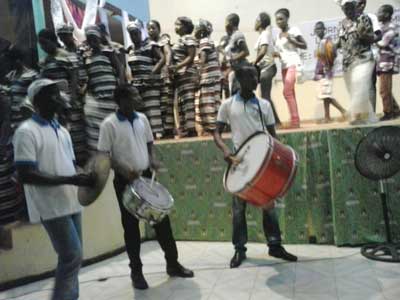
Jul 13, 2016 | Focolare Worldwide
 “A blaze never starts from a large fire, but from a small flame. Today we’re here to light this flame.” These words from Bishop Gaspard Béby Gnéba on the Day of Mercy and Fraternity Among the Peoples, tell what the living experience was like,” write Vitoria Fransiscati and Bertin Lubundi from the permanent Mariapolis in Man, Mariapolis Victoria, at the conclusión of the Day of Mercy organized by the Focolare upon the urging of the Bishop of Man, on June 24-26. The period of preparation allowed for a series of different kinds of encounters in a diocese where only 6% of the members are baptized. So, there are many opportunities for dialogue! Fifteen traditional leaders and 18 imams from 33 of the city’s quarters attended the day on Fraternity in Politics on June 25th. Two of the topics discused were conflict resolution and thoughts and experiences on the “practice of authority” which led to a lively debate. One of the most interesting testimonies was that of Imam Rev. Koné from the most important mosque in Man. He spoke of his relationship with the Catholic bishop: “It was he who first approached me; he first loved me. We came up with a plan of action, and now is the time to put the plan into practice. We need to help one another to respect and accept our differences and to know one another’s faith.” The event opened on the evening of June 24th with a concert called: “Many People, One Family” which included performances by several different ethnic artisitic groups. The Days of Mercy woke up the city of Man with a Peace March: Christians and Muslims marched together on a 7km walk from the centre of the city to the Focolare’s permanent Mariapolis. Then, there was a series of visits and taking gifts to 32 needy families from practically all the quarters in Man. The protagonists were the bishop with his delegation and the families. “They were emotional and joyful moments for the people we visited, also the fact of seeing the bishop himself bringing gifts without expecting anything in return, as unfortunately happens often with some politicians who want to buy support.” This was a start at fulfilling a dream, the Bishop said: “It was a training for people who hold responsiblities in society, adminstrators and those who work in interreligious dialogue, so they might continue to live mercy in civil society.” RTI videonews (original language) https://www.youtube.com/watch?v=yvsr0KwISTs&feature=player_embedded Maria Chiara De Lorenzo
“A blaze never starts from a large fire, but from a small flame. Today we’re here to light this flame.” These words from Bishop Gaspard Béby Gnéba on the Day of Mercy and Fraternity Among the Peoples, tell what the living experience was like,” write Vitoria Fransiscati and Bertin Lubundi from the permanent Mariapolis in Man, Mariapolis Victoria, at the conclusión of the Day of Mercy organized by the Focolare upon the urging of the Bishop of Man, on June 24-26. The period of preparation allowed for a series of different kinds of encounters in a diocese where only 6% of the members are baptized. So, there are many opportunities for dialogue! Fifteen traditional leaders and 18 imams from 33 of the city’s quarters attended the day on Fraternity in Politics on June 25th. Two of the topics discused were conflict resolution and thoughts and experiences on the “practice of authority” which led to a lively debate. One of the most interesting testimonies was that of Imam Rev. Koné from the most important mosque in Man. He spoke of his relationship with the Catholic bishop: “It was he who first approached me; he first loved me. We came up with a plan of action, and now is the time to put the plan into practice. We need to help one another to respect and accept our differences and to know one another’s faith.” The event opened on the evening of June 24th with a concert called: “Many People, One Family” which included performances by several different ethnic artisitic groups. The Days of Mercy woke up the city of Man with a Peace March: Christians and Muslims marched together on a 7km walk from the centre of the city to the Focolare’s permanent Mariapolis. Then, there was a series of visits and taking gifts to 32 needy families from practically all the quarters in Man. The protagonists were the bishop with his delegation and the families. “They were emotional and joyful moments for the people we visited, also the fact of seeing the bishop himself bringing gifts without expecting anything in return, as unfortunately happens often with some politicians who want to buy support.” This was a start at fulfilling a dream, the Bishop said: “It was a training for people who hold responsiblities in society, adminstrators and those who work in interreligious dialogue, so they might continue to live mercy in civil society.” RTI videonews (original language) https://www.youtube.com/watch?v=yvsr0KwISTs&feature=player_embedded Maria Chiara De Lorenzo
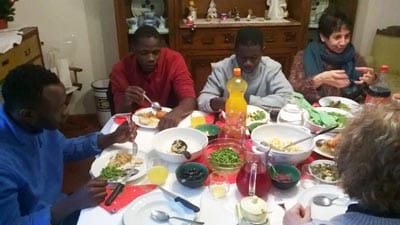
Jul 12, 2016 | Focolare Worldwide
 “There is a vein of illusions and dreaming running through the notion of this project,” recounts Flavia Cerino, lawyer and coordinator of activities in Sicily. We have come up against one of the most complex realities regarding migration, one of the most urgent problems: that of unaccompanied foreign minors (UAM) that arrive on the Italian coasts exhausted from the long voyages, but still full of hope for the future. Among the migrants who reach Europe, unaccompanied minors are undoubtedly the ones most in need of support. In the first five months of 2016 (UNICEF), 7,000 new arrivals were registered in Italy, double the number from the same period in previous years. “In order to be able to live legally in Italy, Flavia adds, these teenagers need to be inserted into the work force as soon as possible. If they don’t manage to do that and to obtain the proper documents, once they become legal adults they are considered illegal with the concrete possibility of falling into an illegal underground network.” “We reflected at length on possible interventions,” adds Francesco Tortorella from the NGO Amu (Azione per un Mondo Unito) and one of the promotors of the present project. We also conferred with a variety of professionals that are familiar with the minute details of this issue. Another promoter, the Cooperativa Fo.Co , has been working for years with teenage migrants and accompanying them over the course of their lives. The contribution of the New Families Association was important from the very start: these teenagers are mostly in need of a family in the broadest sense of the word.”
“There is a vein of illusions and dreaming running through the notion of this project,” recounts Flavia Cerino, lawyer and coordinator of activities in Sicily. We have come up against one of the most complex realities regarding migration, one of the most urgent problems: that of unaccompanied foreign minors (UAM) that arrive on the Italian coasts exhausted from the long voyages, but still full of hope for the future. Among the migrants who reach Europe, unaccompanied minors are undoubtedly the ones most in need of support. In the first five months of 2016 (UNICEF), 7,000 new arrivals were registered in Italy, double the number from the same period in previous years. “In order to be able to live legally in Italy, Flavia adds, these teenagers need to be inserted into the work force as soon as possible. If they don’t manage to do that and to obtain the proper documents, once they become legal adults they are considered illegal with the concrete possibility of falling into an illegal underground network.” “We reflected at length on possible interventions,” adds Francesco Tortorella from the NGO Amu (Azione per un Mondo Unito) and one of the promotors of the present project. We also conferred with a variety of professionals that are familiar with the minute details of this issue. Another promoter, the Cooperativa Fo.Co , has been working for years with teenage migrants and accompanying them over the course of their lives. The contribution of the New Families Association was important from the very start: these teenagers are mostly in need of a family in the broadest sense of the word.” 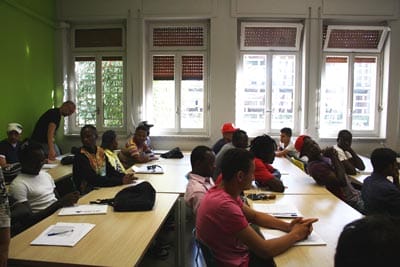 The first phase of the project called “Welcoming & Getting Settled“ was officially begun on last June 6th in Catania and in Ragusa with the launching of professional training courses. Forty three young people were selected, ten of whom were Italians who, because of various disadvantaged backgrounds live in foster settings. The presence of Italian youngsters is a strong point of the project, which wishes to care for vulnerable youngsters regardless of their citizenship. Training will begin in October with the first trainee placements. The second phase of the project – the most innovative – foresees the involvement of businesses that are willing to insert the young people both in the work process and in families in which the young people can find a community of stable relationships that are indispensable for their social integration. Territorial connections have been set up all over Italy that are joined by a secure network that connect families and businesses with the training and work needs of the teenagers. Businesses that belong to the Economy of Communion and to the AIPEC will play a fundamental role, beginning from a network that aims to offer opportunities for the young people who participate in the project to be inserted in the work force.
The first phase of the project called “Welcoming & Getting Settled“ was officially begun on last June 6th in Catania and in Ragusa with the launching of professional training courses. Forty three young people were selected, ten of whom were Italians who, because of various disadvantaged backgrounds live in foster settings. The presence of Italian youngsters is a strong point of the project, which wishes to care for vulnerable youngsters regardless of their citizenship. Training will begin in October with the first trainee placements. The second phase of the project – the most innovative – foresees the involvement of businesses that are willing to insert the young people both in the work process and in families in which the young people can find a community of stable relationships that are indispensable for their social integration. Territorial connections have been set up all over Italy that are joined by a secure network that connect families and businesses with the training and work needs of the teenagers. Businesses that belong to the Economy of Communion and to the AIPEC will play a fundamental role, beginning from a network that aims to offer opportunities for the young people who participate in the project to be inserted in the work force.  The New Families NPO Association’s network has been activated for months, promoting willingness to welcome the young people, since it has already had experience in welcoming them for periods of vacation. “At the end of 2015,” Paola Iacavone wrote, “seven teenagers who live in a group home have been able to have an experience in a family, which was for them and for the family that welcomed them, a very positive experience. They were from Egypt, Mali and Senegal, Coptic Orthodox Christians and Muslims – and they were welcomed by families from Rome, Lanciano, Ancona and Cosenza, Italy.” In short, this experience has only just begun! The project was highly welcomed by the institutions and, if this first experimental model functions, it will certainly be proposed and carried out on a larger scale just as everyone hopes it will. For more information, details and how to contribute go to project website.
The New Families NPO Association’s network has been activated for months, promoting willingness to welcome the young people, since it has already had experience in welcoming them for periods of vacation. “At the end of 2015,” Paola Iacavone wrote, “seven teenagers who live in a group home have been able to have an experience in a family, which was for them and for the family that welcomed them, a very positive experience. They were from Egypt, Mali and Senegal, Coptic Orthodox Christians and Muslims – and they were welcomed by families from Rome, Lanciano, Ancona and Cosenza, Italy.” In short, this experience has only just begun! The project was highly welcomed by the institutions and, if this first experimental model functions, it will certainly be proposed and carried out on a larger scale just as everyone hopes it will. For more information, details and how to contribute go to project website.
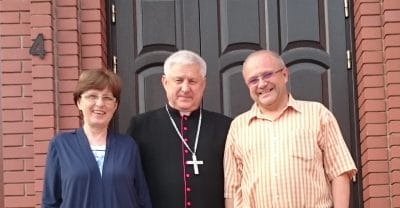
Jul 11, 2016 | Focolare Worldwide
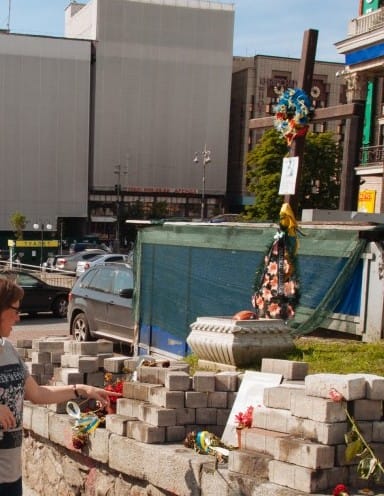 From the end of 2013 when the brazen unrest began in Kiev, by April 2014 during the Ukrainian Revolution the situation was unchanged. The scene was being described on the front pages of all the local newspapers, but now the media no longer talks about it. But the violence continues to paralyze the population that is struggling under such dramatic living conditions. There are small Focolare communities in Ukraine, in Mukachevo, Lviv and Kiev that are trying to respond to the evil all around them. In recent months there were several trips and visits to small Focolare groups in Slovakia at the capital of Kiev and in Kharkiv in the northeast. “With the exodus of the working-age people, the elderly are left in families, perhaps with parents and children of different ages. These children are “social orphans” as descirbed by His Beatitude Svjatoslav Sevcuk, Archbishop of the Greek Catholic Chuch: “they know what a family is only from the internet and, in the future, they’ll never know how to creat a real and healthy family.” The Catholic Church stands among those who are courageously trying to provide humanitarian assistance through Caritas and Religious Institutes. Thanks also to repeated appeals from Pope Francis – the most recent on April 3rd – it has been possible to give legs to a network of assistance for the hardest hit groups that has been gratefully acknowledged by civil authorities, with meals for the poor, rehabilitation centres, homes for teenage mothers and their children born of the violence. The work of the Sisters of Don Orione is significant in this regard; they have set up a house in which to care for them. The Focolare also tries to express its closeness to the Ukrainian people with whom they are in contact through their communities in Slovakia. Recently, in May, one group from Slovakia went to the capital in Kiev to meet with families and others. “Going to the places where the revolution happened two years ago, is always moving. It’s now part of contemporary Ukrainian culture. There are the names of the people who died during the battles at Maydan Square, or the people who died in the war in eastern Ukraine (that is still waging). The people are proud of them,” they write when they return. “We had many conversations about so much pain and fear that is being carried together. . . This is how the people try to put into practice the invitation of His Beatitude Svjatoslav Sevcuk: “We are in need of families that are ‘healers’ for our families.”
From the end of 2013 when the brazen unrest began in Kiev, by April 2014 during the Ukrainian Revolution the situation was unchanged. The scene was being described on the front pages of all the local newspapers, but now the media no longer talks about it. But the violence continues to paralyze the population that is struggling under such dramatic living conditions. There are small Focolare communities in Ukraine, in Mukachevo, Lviv and Kiev that are trying to respond to the evil all around them. In recent months there were several trips and visits to small Focolare groups in Slovakia at the capital of Kiev and in Kharkiv in the northeast. “With the exodus of the working-age people, the elderly are left in families, perhaps with parents and children of different ages. These children are “social orphans” as descirbed by His Beatitude Svjatoslav Sevcuk, Archbishop of the Greek Catholic Chuch: “they know what a family is only from the internet and, in the future, they’ll never know how to creat a real and healthy family.” The Catholic Church stands among those who are courageously trying to provide humanitarian assistance through Caritas and Religious Institutes. Thanks also to repeated appeals from Pope Francis – the most recent on April 3rd – it has been possible to give legs to a network of assistance for the hardest hit groups that has been gratefully acknowledged by civil authorities, with meals for the poor, rehabilitation centres, homes for teenage mothers and their children born of the violence. The work of the Sisters of Don Orione is significant in this regard; they have set up a house in which to care for them. The Focolare also tries to express its closeness to the Ukrainian people with whom they are in contact through their communities in Slovakia. Recently, in May, one group from Slovakia went to the capital in Kiev to meet with families and others. “Going to the places where the revolution happened two years ago, is always moving. It’s now part of contemporary Ukrainian culture. There are the names of the people who died during the battles at Maydan Square, or the people who died in the war in eastern Ukraine (that is still waging). The people are proud of them,” they write when they return. “We had many conversations about so much pain and fear that is being carried together. . . This is how the people try to put into practice the invitation of His Beatitude Svjatoslav Sevcuk: “We are in need of families that are ‘healers’ for our families.”

Elena Vladova, Martin Uher and Stanislav Szyrokoradiuk, Bishop of Kharkiv
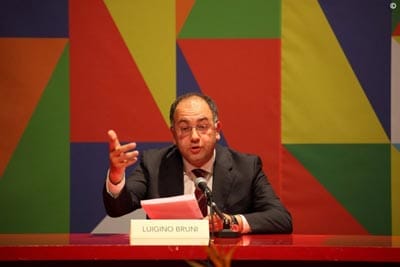
Jul 9, 2016 | Focolare Worldwide
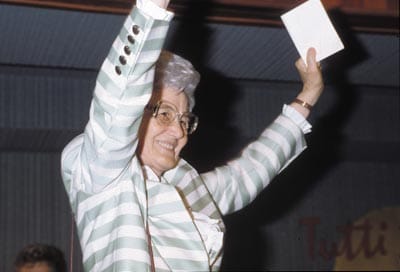
Chiara Lubich, Brazil 1991 – © Centro S. Chiara Audiovisivi
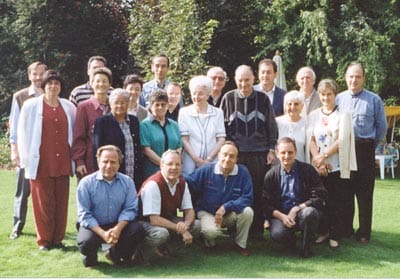
Chiara Lubich and Abba School members (Luigino Bruni, third row, third from right) – © Centro S. Chiara Audiovisivi

© Centro S. Chiara Audiovisivi

 «I’m a priest. One of my former course mates in the seminary who didn’t continue the course for priesthood fell into the habit of gambling, and developed an addiction. He was a brilliant man. His wife had left him due to the debts he accumulated and also his own family didn’t want to have anything to do with him. His earnings were not enough to cover the bank interests. When he contacted me to ask my help, I listened to him lengthily. But his main worry was only to pay his debts, and did not want any counsel. I introduced him to a doctor friend and a lawyer: the addiction issue was evident. So I tried to find a centre that could treat this problem and also the lawyer committed his free services. Now he’s in an institute and recovering well. One day while I was praying for him, I realized that to be able to show true charity, we need to use our hearts, minds and strength.» (B. D. – Italy) The next-door neighbour
«I’m a priest. One of my former course mates in the seminary who didn’t continue the course for priesthood fell into the habit of gambling, and developed an addiction. He was a brilliant man. His wife had left him due to the debts he accumulated and also his own family didn’t want to have anything to do with him. His earnings were not enough to cover the bank interests. When he contacted me to ask my help, I listened to him lengthily. But his main worry was only to pay his debts, and did not want any counsel. I introduced him to a doctor friend and a lawyer: the addiction issue was evident. So I tried to find a centre that could treat this problem and also the lawyer committed his free services. Now he’s in an institute and recovering well. One day while I was praying for him, I realized that to be able to show true charity, we need to use our hearts, minds and strength.» (B. D. – Italy) The next-door neighbour  «One of my neighbours was in trouble: we could see this in the way she dressed and her sad looks. When I invited her to the house one afternoon, she confided that they had used up all their savings for her husband’s illness and the pension was not enough to live on. My husband and I decided to offer them a part of our savings. She didn’t want to accept since she wouldn’t be able to pay us back. But we insisted, confiding that divine Providence would give us a hand if we ever needed it. Shortly after, our daughter started to work and needed a car to move around, but we didn’t have enough to buy one. When a relative of our neighbor discovered this, she gave us her car as a gift; she no longer used it and it was still in excellent condition. Her reason for this gesture was: “I found out what you did for my aunt and uncle. It’s the least I could do to thank you.”» (R. F. – France) Red beet juice
«One of my neighbours was in trouble: we could see this in the way she dressed and her sad looks. When I invited her to the house one afternoon, she confided that they had used up all their savings for her husband’s illness and the pension was not enough to live on. My husband and I decided to offer them a part of our savings. She didn’t want to accept since she wouldn’t be able to pay us back. But we insisted, confiding that divine Providence would give us a hand if we ever needed it. Shortly after, our daughter started to work and needed a car to move around, but we didn’t have enough to buy one. When a relative of our neighbor discovered this, she gave us her car as a gift; she no longer used it and it was still in excellent condition. Her reason for this gesture was: “I found out what you did for my aunt and uncle. It’s the least I could do to thank you.”» (R. F. – France) Red beet juice  «Cristina, a widow for some years now, has never given up in the face of difficulties that arose after her husband’s death. In fact, she doubled her commitment to help others. Her colleague at work, also a widow, was not liked by the others because of her ways. One day, seeing her very pale face, Cristina asked her what was wrong. The colleague answered vaguely that she was not well and was taking a lot of medicine. So Cristina started to prepare a bottle of red beet juice for her every week. Surprised by all this caring, the colleague confided to Cristina: “I think that the force you have in going towards others is a gift from God, unlike me because I only lived on anger and pain after my husband’s death. This is the real disease I have.”» (C. K. – Hungary) Source: The day’s Gospel, New City, July 2016
«Cristina, a widow for some years now, has never given up in the face of difficulties that arose after her husband’s death. In fact, she doubled her commitment to help others. Her colleague at work, also a widow, was not liked by the others because of her ways. One day, seeing her very pale face, Cristina asked her what was wrong. The colleague answered vaguely that she was not well and was taking a lot of medicine. So Cristina started to prepare a bottle of red beet juice for her every week. Surprised by all this caring, the colleague confided to Cristina: “I think that the force you have in going towards others is a gift from God, unlike me because I only lived on anger and pain after my husband’s death. This is the real disease I have.”» (C. K. – Hungary) Source: The day’s Gospel, New City, July 2016 








